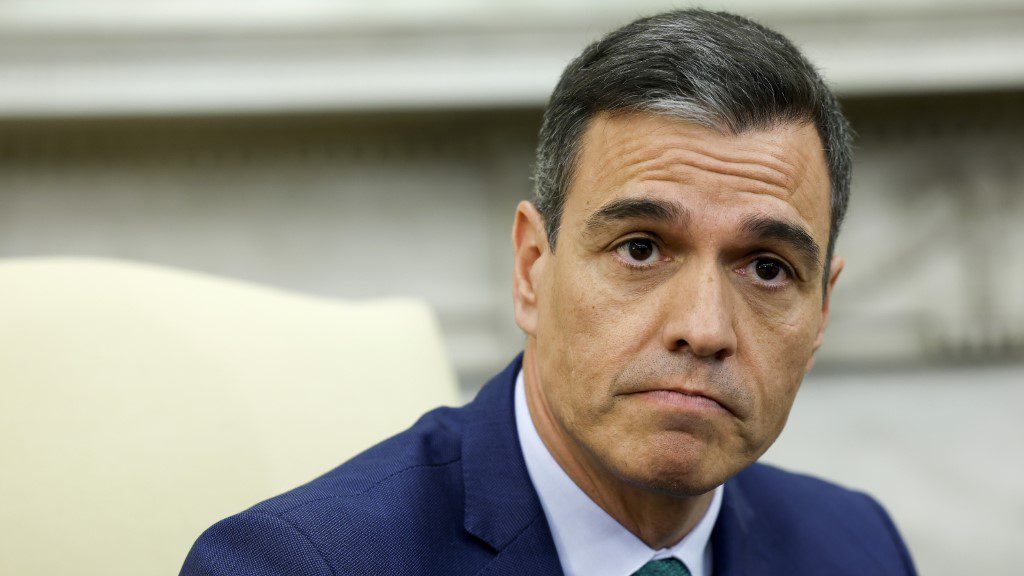
Spain’s Prime Minister Pedro Sánchez gives remarks to reporters alongside U.S. President Joe Biden before a bilateral meeting in the Oval Office of the White House on May 12, 2023 in Washington, D.C. President Biden and Prime Minister Sánchez met to discuss Ukraine, trade and immigration.
Photo: Anna Moneymaker/Getty Images/AFP
Spain has agreed to take in more Latin American migrants and asylum seekers over the next three years in collaboration with the U.S.
Spain, which gave its initial commitment last summer, has now agreed to participate in a U.S. effort to prevent migrants and asylum seekers from trekking to the U.S.-Mexican border by accepting asylees processed through regional migration centers in Guatemala and Colombia.
The U.S. announced the creation of two migration processing centers, one in Colombia and one in Guatemala, last month, though neither is operational yet, hoping to establish up to 100 others in the western hemisphere. United Nations organizations will run the centers, but U.S. officials will help with the processing of applications, and Spain and Canada have agreed to also receive refugees granted asylum through the centers. Spain will be able to select which migrants it accepts based on their job skills.
“They give would-be migrants the ability to stay in their own countries and determine their eligibility for lawful pathways to come to the U.S.,” U.S. Secretary of State Anthony Blinken said in a joint press conference with Spain’s foreign affairs minister José Manuel Albares.
“We’re grateful for Spain’s willingness to cooperate with us on these regional processing centers,” he added. “Spain has already received hundreds of thousands from the region and has increased its commitment to receive more.”
Albares emphasized that the collaboration would help ensure “safe, humane, orderly and regular” migration.
“We defend together a global order based on the rule of law,” Albares said. “This agreement responds to a shared vision.”
Spain’s Ministry of Inclusion, Social Security, and Migration also said in a statement on its website that in the agreement, the country would be taking in more immigrants from Latin America “through channels that respond to the needs of the labor market, reinforcing existing operational capacities.”
The ministry explained that it would be “extending the current circular migration program” and also allowing entry through “a new complementary resettlement route” for asylees and refugees that matches “companies that offer work contracts for people in need of international protection” with those “who have skills to match labor shortages.”
Migration from South America across the U.S.-Mexican border surged in 2015 and has reached new highs in recent months. Communities and services near both sides of the border are overwhelmed with migrants seeking asylum in the U.S.
The city of El Paso, Texas, has been particularly hard hit with asylum seekers released from being held in custody by immigration authorities, sometimes before being completely processed through the initial stages of the asylum process, as the judiciary is also overextended. The federal government has released emergency funding to help the city cope with the situation and numerous charities have stepped up to help shelter migrants and facilitate their movement to their destination for employment or to reunite with family or friends. But the situation is still chaotic.
Those south of the border live under dangerous conditions in refugee camps. Since U.S. President Joe Biden took office in 2021, Human Rights First has tracked more than 13,480 reports of violent attacks on migrants hovering around the border in Mexico, including killings, kidnappings, and rapes.
In addition to the meeting between Blinken and Albares, Spanish Prime Minister Pedro Sanchéz met with U.S. President Joe Biden on Friday, May 11th. In his meeting at the White House, Sanchéz secured a commitment from the U.S. to clean up the nuclear waste at Palomares, in southwest Spain, the site of a crash in 1966 of a B-52 bomber carrying nuclear warheads. This is not the first time the U.S. has promised to clean up the disaster area. The Obama administration had also promised to remove the contaminated soil and store it in the U.S.
Additionally, Sanchéz and Biden discussed collaboration in Africa, including on the violence in the Sahel region, on the issue of droughts, the areas of science, space exploration, and ‘LGBT’ rights.
